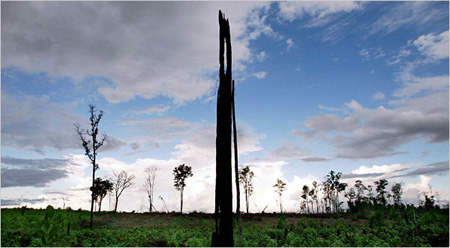Forest loss in Sumatra becomes a global issue
Updated: 2007-12-06 16:20
KUALA CENAKU, Indonesia -- Here on the island of Sumatra, about 1,200 miles from the global climate talks under way on Bali, are some of the world's fastest-disappearing forests.
A look at this vast wasteland of charred stumps and dried-out peat makes the fight to save Indonesia's forests seem nearly impossible.
|
|
In recent years, dozens of pulp and paper companies have descended on Riau, which is roughly the size of Switzerland, snatching up generous government concessions to log and establish palm oil plantations. The results have caused villagers to feel panic.
Only five years ago, Mr. Helman said, he earned nearly $100 a week catching shrimp. Now, he said, logging has poisoned the rivers snaking through the heart of Riau, and he is lucky to find enough shrimp to earn $5 a month.
Responding to global demand for palm oil, which is used in cooking and cosmetics and, lately, in an increasingly popular biodiesel, companies have been claiming any land they can.
Fortunately, from Mr. Helman's point of view, the issue of Riau's disappearing forests has become a global one. He is now a volunteer for Greenpeace, which has established a camp in his village to monitor what it calls an impending Indonesian "carbon bomb."
Deforestation, during which carbon stored in trees is released into the atmosphere, now accounts for 20 percent of the world's greenhouse gas emissions, according to scientists. And Indonesia releases more carbon dioxide through deforestation than any other country.
Within Indonesia, the situation is most critical in Riau. In the past 10 years, nearly 60 percent of the province's forests have been logged, burned and pulped, according to Jikalahari, a local environmental group.
"This is very serious -- the world needs to act now," said Susanto Kurniawan, a coordinator for Jikalahari who regularly makes the arduous trip into the forest from the nearby city of Pekanbaru, passing long lines of trucks carting palm oil and wood. "In a few years it will be too late."
The rate of this deforestation is rising as oil prices reach new highs, leading more industries to turn to biodiesel made from palm oil, which, in theory, is earth-friendly. But its use is causing more harm than good, environmental groups say, because companies slash and burn huge swaths of trees to make way for palm oil plantations.
|
|
|
||
|
||
|
|
|
|


